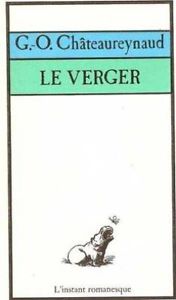“The Orchard,†Georges-Olivier Châteaureynaud’s most oft-reprinted story in France, makes its English-language debut at Web Conjunctions, the online wing of the celebrated literary magazine. This delicate and mournful tale of a child in a concentration camp has echoes of I.B. Singer, and was singled out by Marcel Schneider in his history of the French fantastique:
It would be easy to lend this apologue a moral meaning: the curse of being alone in Paradise, the need to share in shared misfortune, the fate of the tribe. But none of this ever crossed the author’s mind. At the origins of this story are a dream, a series of dreams, a hallucination from childhood. His own father having suffered deportation and internment, Châteaureynaud violently felt the brutality of the camps. What touches the reader is the tale’s perfection and the strange beauty emanating from it. The author gives no thought to turning it into a moral tale.
I am not sure why this chapbook version of it has a hippo on the cover, since no hippos, alas, figure in the story.
Here’s an excerpt:
One soldier stayed to the side. Though the child couldn’t make out his face at this distance, he knew it was his pursuer. The man had slung his truncheon back onto his belt. He smoked pensively in the night, staring at the barbed wire. The child blinked. He struggled against sleep for a few moments more, but his head was too heavy, and the grass too soft. He surrendered. At an order, the soldiers tossed their cigarettes aside and lined up. Following the officer, they headed back through the muddy field. The noise their boots made, the same hammering that had sometimes kept him up all night when it rang through the streets of his village—now the child didn’t hear a thing. He slept.

Leave a Reply